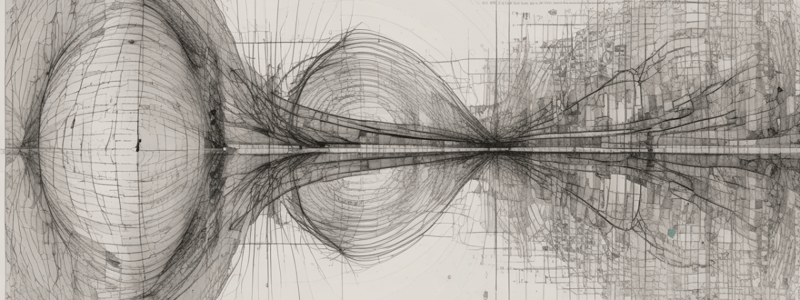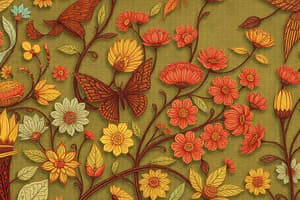Podcast
Questions and Answers
Who is often referred to as the 'father' of modern concrete poetry?
Who is often referred to as the 'father' of modern concrete poetry?
- Eugen Gomringer (correct)
- Ezra Pound
- Augusto de Campos
- George Herbert
Which poem by George Herbert is famous for its visual pattern of two wings spread open?
Which poem by George Herbert is famous for its visual pattern of two wings spread open?
- The Collar
- Jordan (I)
- Love (III)
- Easter Wings (correct)
Who was a prominent figure in South American concrete poetry, similar to Eugen Gomringer in Europe?
Who was a prominent figure in South American concrete poetry, similar to Eugen Gomringer in Europe?
- Ezra Pound
- T.S. Eliot
- Augusto de Campos (correct)
- William Carlos Williams
Which poem by Eugen Gomringer repeats the word 'silencio' in the shape of an open rectangle?
Which poem by Eugen Gomringer repeats the word 'silencio' in the shape of an open rectangle?
Which poem by Augusto de Campos repeats a phrase and removes a letter each time until only the 'o' is left?
Which poem by Augusto de Campos repeats a phrase and removes a letter each time until only the 'o' is left?
What is the visual pattern created by the lines of George Herbert's 'Easter Wings'?
What is the visual pattern created by the lines of George Herbert's 'Easter Wings'?
Which poem by Eugen Gomringer brings an audio dimension to its message through absence and repetition?
Which poem by Eugen Gomringer brings an audio dimension to its message through absence and repetition?
Who published an entire book of concrete poems titled Konstellationen?
Who published an entire book of concrete poems titled Konstellationen?
Which poem by Augusto de Campos seems to twist or turn at the center point?
Which poem by Augusto de Campos seems to twist or turn at the center point?
What year was George Herbert's 'Easter Wings' published after his death?
What year was George Herbert's 'Easter Wings' published after his death?
Flashcards are hidden until you start studying
Study Notes
Definition and Purpose of Concrete Poetry
- Concrete poems function as art objects that combine visual and verbal elements to convey meaning.
- The arrangement, spacing, color, and font of the printed text, as well as graphics and symbols, contribute to the poem's meaning.
- Concrete poems aim to express meaning and messages both visually and verbally.
History of Concrete Poetry
- Concrete poetry originated in ancient Greece with the practice of technopaegnia or "shaped poetry".
- The tradition continued in medieval Christian texts and Hebrew and Arabic scripts, where the shape and pattern of the alphabet and symbols were used to present religious and literary texts visually.
- In the 16th century, poets created "altar poems" that mirrored the shape of an altar.
- Modern poets in the 1950s re-imagined concrete poetry, drawing on modern art and architecture.
Characteristics of Concrete Poetry
- Active use of graphic space on the page or how the poem is printed or displayed.
- Intentional use of the visual aspects of language as well as its literal and poetic qualities.
- Strong relationship between the message or meaning of the poem and its visual appearance.
- Emphasis on graphic space, typography, and visual arrangement.
Types of Concrete Poems
- Outlines: words arranged in an outline of a key symbol or object described in the poem.
- Solid shapes: lines of the poem printed to form a more solid shape.
- Combining strategies: combining outline and solid shape techniques.
Famous Concrete Poems
- "The Altar" by George Herbert (1633): a poem printed in a column shape, reflecting the theme of spiritual devotion.
- "Easter Wings" by George Herbert (1633): a poem with lines printed vertically to create a visual of a pair of wings.
- "Silencio" by Eugen Gomringer (1953): a poem that prints the word "silencio" 14 times in an open rectangle shape, suggesting silence.
- "Sem Um Numero" by Augusto de Campos (1950s): a poem that repeats the title phrase, removing a letter each time, to create a visual image.
Studying That Suits You
Use AI to generate personalized quizzes and flashcards to suit your learning preferences.




